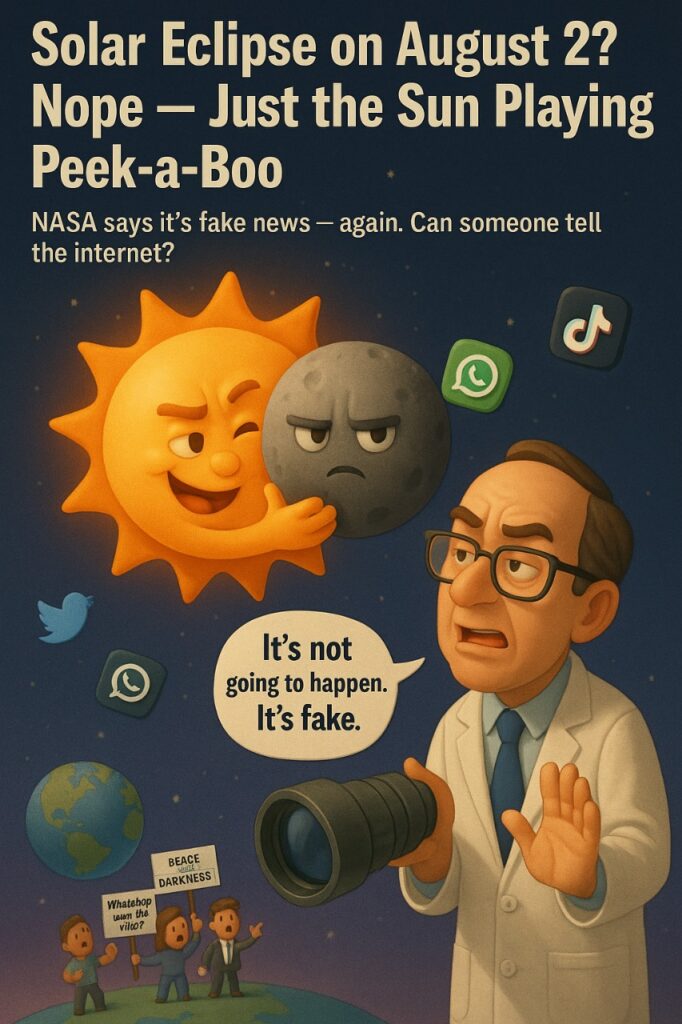It started like all great modern-day mysteries do – on WhatsApp. And then TikTok. Then some Insta astrologer reels. Before you knew it, half the internet was convinced that a rare Solar Eclipse on August 2, 2025, would turn the world dark for six entire minutes.
“Mark your calendars,” the viral posts warned. “It’s the longest total solar eclipse of the century.” Hashtag apocalypse. Hashtag third eye awakening. Hashtag… no.

From astrology-laced voice notes to badly edited “NASA confirms” screenshots, the hoax spread faster than your uncle’s cricket updates in the family group.
NASA Says Nope to the Rare Solar Eclipse
Let’s set the record straight. NASA has categorically denied that there is any total or even partial solar eclipse scheduled for August 2, 2025.
“There is no solar eclipse of any kind on that date,” confirmed NASA (who is pretty much the Beyoncé of eclipses).
In fact, the next actual total solar eclipse that could warrant sunscreen, eclipse glasses, and mild existential panic is on August 2, 2027. That one will be visible across parts of Spain, North Africa, and the Middle East—not India.
What about 2025? Sure, we have two partial solar eclipses on March 29 and September 21, but neither is visible from most of India or the US. Just a cosmic snooze-fest compared to viral fiction.
Why the Rumor of Solar Eclipse on August 2 Spread
Like most fake news, this one was a cocktail of:
- Real future event (2027 eclipse)
- Misinterpreted date (hello, August 2 twins!)
- Astrological fuel (no Surya Grahan = no rituals = how dare you?)
- Internet’s tendency to lose it every time the sky does anything.
The viral messages even included claims of “cosmic blackout” and “electromagnetic resets.” All untrue. All unverified. All painfully forwarded.
Even Vedic astrologers stepped in to call this bluff. Turns out, August 2 does not even align with Amavasya, the no-moon night needed for Surya Grahan. Cosmic case closed.
When is the Next Real Solar Eclipse?
Circle your calendars, but not for 2025.
The next grand total solar eclipse is on August 2, 2027, with a maximum duration of 6 minutes and 23 seconds. It will grace the skies of Spain, Algeria, Egypt, and Saudi Arabia.
If you are in India, you will only see a partial glimpse in the western regions. Not blackout-worthy, but still cool if you are into filtered sunlight and staring at the sky with cardboard glasses.
Meanwhile, 2025’s September 21 eclipses will mostly be visible in remote Southern Hemisphere locations. So unless you have booked a flight to the tip of Antarctica, you will miss those too. And that’s okay.
Solar Eclipse and Superstition
In India, eclipses come with rituals: fasting, no eating after sunrise, temple closures, pregnant women staying indoors. But all of that only kicks in when there’s an actual eclipse.
For August 2, 2025, none of this is astrologically or astronomically relevant. Even astrologers—usually on speed dial during eclipses—are saying “guys, chill.”
If you are fasting that day, let it be for your fitness goals, not a forwarded rumour.
Scroll Responsibly: Fighting Fake News
This is not just about eclipses. It’s about how easy it is to fall for anything with “NASA confirms” slapped on a Canva graphic.
The sun is not turning off. The moon is not throwing shade. And your WiFi will be just as bad as ever.
Check NASA’s official eclipse calendar. Or ISRO. Or, heck, even Wikipedia before changing your schedule based on social media astronomy.
Because while the sky might be mostly harmless, fake news definitely isn’t.
Sign-Off With Satire
So no, we are not heading into six minutes of darkness. The only eclipse happening on August 2 is the one on our collective logic.
But hey—look on the bright side. The sun still shines. The moon still minds its business. And you have now got two years to prepare for the real show in 2027. Bring your glasses. Not your gossip.
Keep following The Peak View Stories as we track the myths, memes, and moments that shape our collective scrolling experience.
Because when the next real eclipse arrives, we promise, we won’t just illuminate the facts. We will make sure they shine.
Disclaimer: This article is based on verified data from NASA, ISRO, and scientific communities. It is not intended to offer religious, astrological, or fasting advice. Always cross-check information with certified astronomy sources before adjusting life choices around the moon’s mood swings.